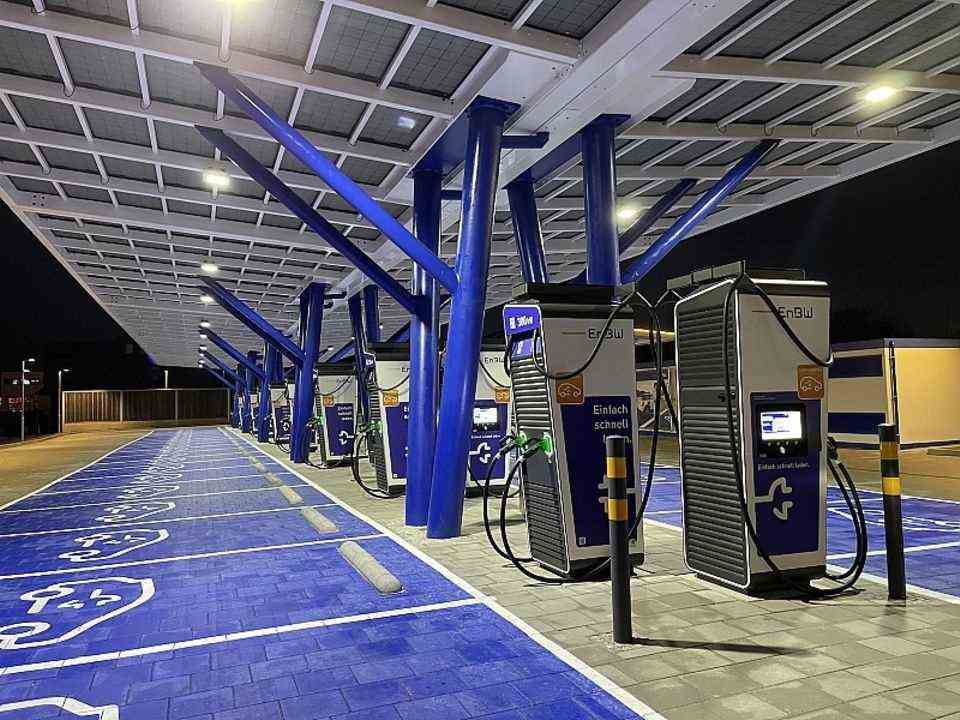The big charging parks are coming
Register charging
EnbW Kamen Cross
© press-inform – the press office
The number of charging stations is growing every week, but there is a lack of fast chargers in the city centers. Things look very different on the autobahns, because more and more charging parks are springing up here, making long stretches more electrified than ever.
The inconspicuous industrial area not far from the Kamener Kreuz is not one that a passing car driver should noticeably notice. If you are on the A1 motorway or want to take the A2 towards Hanover or Oberhausen, you may make a short stop here to stop by McDonald’s or Connie’s diner for a burger or coffee. If you like it more Italian, go to L ‘Osteria, stop by Ikea or Kaufland. The real show at the so-called Kamen Karree not far from Unna-Königsborn, however, is the new charging park operated by EnBW, one of the largest of its kind in all of Germany and therefore a big number across Europe. The so-called HPC charging points (High Power Charger) have an output of up to 300 kilowatts. Depending on the corresponding electric vehicle, the models with a plug can be used in five to ten minutes for the next 100 kilometers. As at all EnBW charging points, only green electricity flows here. “The location in Kamen is the next step in fast charging, after we have been operating a new fast charging location every day for more than a year. It shows how charging works quickly and easily now and in the future,” says Timo Sillober, Chief Sales and Operations Officer at EnBW.
While many charging stations have been located on the edge of existing parking lots and there is a lack of the necessary lighting, the situation is very different at not far from the Kamener Kreuz, because the total of 52 charging points are covered and illuminated as bright as day even at night. A photovoltaic system supplies the location with electricity of up to 120 kilowatts and feeds excess energy into the local grid. In order to shorten the time spent refueling, there is a toilet system and a WiFi network for fast data transfer with a mobile phone, tablet or computer.
EnBW has currently opened around 50 large fast charging parks or is planning to open them in the coming months. EnBW CEO Mastiaux is particularly hoping for additional momentum from the new federal government: “The new federal government wants to make Germany a lead market for electromobility. In order for this to succeed, we need more torque when expanding the charging infrastructure. We can learn from the energy turnaround: Overregulation should we avoid prioritizing the market-driven expansion – and realizing planning, approval and funding procedures more quickly in the future. ” The prices for an EnBW kilowatt hour for your own electric car are between 36 and 55 cents – with the monthly basic fee of 5.99 euros being significantly cheaper than many competitors.
But EnBW is not the only provider pushing the pace with the expansion of the fast charging network. Competitor Fastned has also put several new charging parks into operation along the major traffic arteries in the past few months. Since November, the locations in Michelstadt, Hermsdorf, Markt Kinding, Bensheim and Eching have been adding five stations to Fastneds’ German fast charging network with a total of 22 charging points. Nationwide, the number of locations grew to just under 30, and Europe-wide to 172. The Dutch company increased its sales in the third quarter of 2021 by 96 percent to 3.2 million euros. For comparison: in the third quarter of the previous year sales were 1.6 million euros. In most European countries, a kilowatt hour costs EUR 0.69; with the gold membership for a monthly membership fee of 11.49 euros still 0.45 euros.
Ionity, another provider of charging stations based in Munich, recently announced an investment of 700 million euros. Ionity is not only backed by numerous car manufacturers such as Audi, BMW, Kia or Mercedes, but also recently the new partner BlackRocks Global Renewable Power Platform. By 2025, Ionity aims to more than quadruple the number of 350 kW charging stations to around 7,000. In the future, the new charging parks are no longer to be built exclusively on motorways, but also in the vicinity of large cities and along busy trunk roads. Future locations are planned with six to twelve charging stations. In addition, existing locations along highly frequented routes with a great need for charging infrastructure are to be upgraded with additional charging stations. Ionity has now also increased its prices. Without a monthly contract, the kilowatt hour costs an expensive 0.79 euros. With a monthly base price of 17.99, the individual kilowatt hour is reduced to 0.35 euros. The charging card or app currently gives access to 300,000 charging points in 26 European countries.


